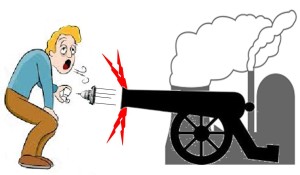Contesting Pollution in Your Community – Another Right Soon to be Gone

Senate Bill 709, which passed in the Texas Senate on April 16th and has now passed in the Texas House, would scale back the public’s right to participate through a contested-case, an administrative hearing process that allows the public to challenge industrial applications for permits at the Texas Commission on Environmental Quality (TCEQ) – such as those allowing wastewater discharges or air pollution emissions.
Last night this bill was discussed and passed to third reading in the Texas House. During the discussion of this bill, it was alleged that “Texas’ current bureaucracy puts the state at a ‘serious disadvantage’ compared to its neighbors,” according to Rep. Geanie Morrison, R-Victoria, who carried the bill in the House. However, the truth is that there are just not that many permit applications that are affected by the contested case hearing process. In 2014, there were 1,960 applications received by TCEQ. Of those applications, only 10 were referred to the State Office of Administrative Hearings – that’s only one half of one percent of applications received in that calendar year. The other 99.5% of permit applications to the TCEQ go uncontested and are processed and issued in time-frames similar to or even faster than our neighboring states with whom we compete most closely for business. This was based on an analysis of public records by Public Citizen and later confirmed by the agency to the Texas Tribune.
This analysis also found that Texas typically processes air quality permits faster than Arkansas, Arizona, Oklahoma, New Jersey, Colorado and even Louisiana. When pressed for one facility Texas might have lost to Louisiana because of a misconception about our permitting process, on the floor of the Texas Senate, Senator Fraser gave the example of Shintech, Inc. (a Japanese subsidiary of Shin Etsu and the largest producer of polyvinyl chloride (PVC) in the United States). In 1998, Shintech backed out of its plans to build a PVC plant in Convent, LA (which is in the heart of what has become known as “Cancer Alley”, an environmental justice community of low-income, minority residents) This community fought back and won because of legal opposition by the local residents. Since that time, Louisiana put rules in place that makes it harder for citizens to obtain legal help to fight off industry – sound familiar? So now Shintech will be able to expand their operations in Louisiana without much opposition and if they come back here . . . well, they may find the same “business-friendly” fast-track environment.
If this bill is enacted into law, the contested case process that has a track record of improving permits and protecting the environment from the biggest and longest lasting environmentally hazardous projects, would be substantially amended.
In an impassioned speech on the floor last night, Representative Sylvester Turner (D-Houston), who saw his and other proposed amendments to soften the bill shot down, said, “This bill is very, very serious. You will have to explain to your constituents why you have taken away their right, why you have enhanced their burden and why you have stripped them of protection.” Today, he was finally able to get one amendment adopted that requires TCEQ to notify the state senator and representative 30 days before a draft permit for a proposed facility in their district is issued. If that stays in place as this bill moves to the final stages before it can become a law, citizens can contact their local representatives about their concerns if the new process shuts them out from being able to participate as fully as they could have before. We know Representative Turner will listen to you. But below is information representative of how the votes went last night in the House on amendments that would have given you, the citizen, more rights:
Against the amendments: Anderson, R.; Ashby; Aycock; Bohac; Bonnen, D.; Bonnen, G.; Burkett; Burns; Burrows; Button; Capriglione; Cook; Craddick; Crownover; Cyrier; Dale; Darby; Davis, S.; Elkins; Faircloth; Fallon; Farney; Fletcher; Flynn; Frank; Frullo; Galindo; Geren; Goldman; Gonzales; Guillen; Harless; Hughes; Hunter; Isaac; Kacal; Keffer; Keough; King, K.; King, P.; Klick; Koop; Krause; Kuempel; Landgraf; Larson; Laubenberg; Leach; Lozano; Metcalf; Miller, D.; Miller, R.; Morrison; Murphy; Murr; Otto; Paddie; Parker; Paul; Peña; Phelan; Phillips; Price; Raney; Rinaldi; Schaefer; Schofield; Schubert; Shaheen; Sheets; Sheffield; Simpson; Smith; Spitzer; Stephenson; Thompson, E.; Tinderholt; Turner, E.S.; VanDeaver; Villalba; White, J.; Workman; Wray; Zedler; Zerwas
For the amendments: Allen; Alonzo; Alvarado; Anchia; Anderson, C.; Bernal; Blanco; Coleman; Collier; Davis, Y.; Deshotel; Dutton; Farias; Farrar; Giddings; González; Guerra; Gutierrez; Hernandez; Herrero; Howard; Huberty; Israel; Johnson; King, T.; Longoria; Lucio; Márquez; Martinez; Martinez Fischer; McClendon; Meyer; Miles; Minjarez; Moody; Naishtat; Nevárez; Oliveira; Pickett; Raymond; Reynolds; Riddle; Rodriguez, E.; Rodriguez, J.; Romero; Rose; Sanford; Simmons; Springer; Thompson, S.; Turner, C.; Turner, S.; Vo; Walle; Wu
And for additional reference, here is a representative vote on a similar amendment to make sure your rights were kept in place on the Senate side: